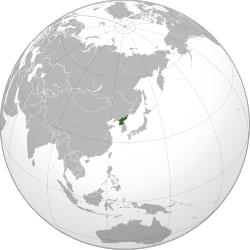North Korea-US Pact In Peril – Analysis
By SAAG
By Rajeev Sharma
After Myanmar opened up to the international community and even hosted US Secretary of State Hillary Clinton recently, it was expected that North Korea, probably the last pariah nation, too would follow suit. It seemed to be happening. On February 29, 2012 North Korea and the United States reached a landmark deal during talks in Beijing that envisaged the US shipping 240,000 metric tons of food to North Korea in return for a halt in Naypyidaw’s nuclear weaponization programme. But now this deal is facing an acute threat of being nullified.
The deal was that North Korea would put “a moratorium on long-range missile launches, nuclear tests, and nuclear activities at Yongbyon, including uranium enrichment activities” in return for 240,000 tons of food aid. During negotiations the Americans had made it clear to the North Koreans that a satellite launch by
Pyongyang would be a deal-breaker.

The apprehension was that North Korea would go back on its word after receiving the food aid. What has happened is much worse. The North Koreans have reneged once again even before the food shipment arrived and announced their intention of going ahead with a long-range rocket launch, expected to happen within days. This is nothing unusual as far as the North Koreans have concerned.
As a result, the United States has now suspended the food aid agreement. The development is a huge setback to the international community’s efforts of bringing the fire-spewing North Korea into the fold of the modern world. Pyongyang’s past conduct has shown that it takes one step forward only to take two steps backward shortly thereafter.
During the February 23-24 negotiations, among other things, North Korea had also apparently consented to allow visits by International Atomic Energy inspectors primarily to confirm two things: moratorium on uranium enrichment and disablement of its nuclear reactor at Yongbyon. The US State Department made a categoric statement enlisting the responsibilities Pyongyang was expected to discharge: “To improve the atmosphere for dialogue and demonstrate its commitment to denuclearization, the DPRK (North Korea) has agreed to implement a moratorium on long-range missile launches, nuclear tests, and nuclear activities at Yongbyon, including uranium enrichment activities.”
Pyongyang is forwarding the same arguments in defence of the proposed rocket launch as it had been making before its deal with Washington: (i) that the launch is part of a “peaceful space programme”, and (ii) that the launch is nothing more than the deployment of a “earth observation satellite.” As per the latest reports, North Korea has already moved its long-range ballistic rocket, Kwangmyongsong-3 or Bright Star -3, to a northwestern launch site.
North Korea’s rocket launch move as part of the festivities to mark the 100th anniversary of the founding of the Democratic People’s Republic of Korea has already triggered concern and condemnation from two of its important neighbours: South Korea and Japan. In fact the Japanese government is under pressure from its media and citizens to shoot down the North Korean rocket soon after its launch in view of the danger of its fragments falling on Japanese territory. Japan has found out that the North Korean rocket will pass over the Japanese territory of the Nansei Islands in waters west of Kyushu. The North Korean act may plunge the Far East into a deep political crisis. If Japan or South Korea were to actually shoot it down after its launch it would be catastrophic.
The problem is that the Western world has a different view. The United Nations had passed a UN Security Council resolution 1874 immediately after North Korea’s 2009 satellite launch and missile tests, proscribing testing of multi-stage rockets by North Korea. Pyongyang has appealed to the United States to change its “hostile policy”. The rocket launch would not only kill the US-North Korea deal but would also aggravate the political crisis. It may also result in an unusually tough stance from the US as the rocket launch would directly question the Obama administration’s support of limited agreements with North Korea.
It would indeed be a pity if in this new age the impoverished North Koreans are made to live in isolation and wilderness by their political leadership for no fault of theirs. North Korea new leader Kim Jung-un, who is just 28, has a whale of a chance to turn things around and bring his country back into the international mainstream the way Myanmar is doing now.
More so because it is believed that the US-North Korea deal was actually choreographed by his father Kim Jong-il before he died on December 17, 2011. Jong-un’s leadership skills are on test. Equally importantly, China too is on test because China has been the mother kangaroo for the baby North Korea for decades. China needs to realize that it cannot go on keeping in its embrace such troublesome impoverished nations as North Korea.
Kim Jong-un needs to follow Myanmar’s example. Myanmar too, like North Korea, had been sitting in the pouch of the Chinese kangaroo for decades, but now it has come out. Myanmar has opened up to the world politically and diplomatically and is very keen on opening its economy to the world. Myanmar seems to have realized the fruits of economic reforms being enjoyed by China which abandoned the Maoist principles of isolation and self-reliance to become a driver of the global economy.
North Korea, on the other hand, still refuses to move towards market-driven economics and does not understand the importance of valuing diplomatic protocols and etiquettes. North Korea’s diplomatic belligerence and flexing of its military muscles are the tactics of the Cold War era, like the incident of the sinking of the South Korean navy corvette Cheonan in which 48 sailors were killed, and need to be done away with.
